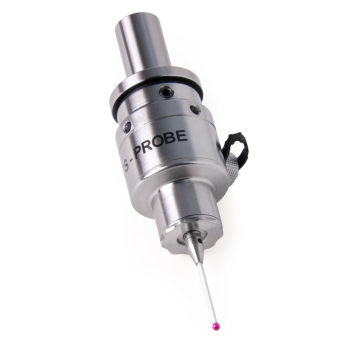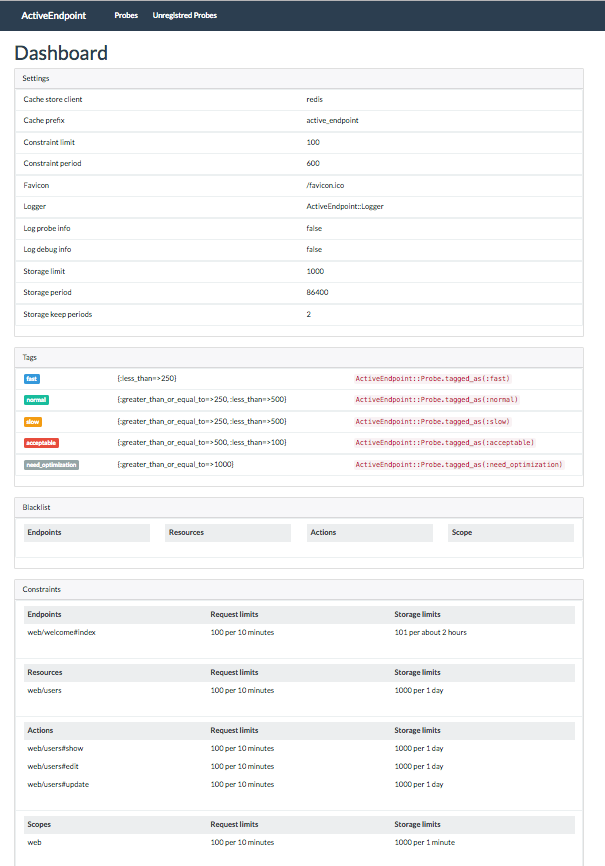ActiveEndpoint 


Your request tracking tool for rails applications
Attention! Gem in under active test and is preparing for first release !
Usage
ActiveEndpoint is middleware for Rails applications that collects and analyses requests and responses per request for endpoint. It works with minimal impact on application's response time.
This gem uses ActiveSupport::Notifications and Cache Storage to reduce possible impact on application request / response processing time.
Features
- Metrics are stored in database for further tracking and analysis.
- History rotation with configurable limits of records amount and age.
- Routes filter (blacklist).
- Probes tagging by processing time.
Metrics
These endpoint metrics are stored in DB:
:uuid- uniq probe identifier:endpoint- requested endpoint:path- requested full path:query_string- request query string:request_method- http request method:ip- ip address asked request:url- request full url:xhr- is request ajax?:started_at- probe start time:finished_at- probe finish time:duration- probe request duration:params- parsed requested params:response- Base64 encoded html response:body- Base64 encoded request body
Additional information is taken from Rack log:
:base_url, :content_charset, :content_length, :content_type, :fullpath, :http_version, :http_connection, :http_accept_encoding, :http_accept_language, :media_type, :media_type_params, :method, :path_info, :pattern, :port, :protocol, :server_name, :ssl.
Requests which are not recognized by rails router are stored as unregistred.
Requirements
redisas cache storage
Be sure that you have all requrements installed on you machine.
Installation
Add this line to your application's Gemfile:
gem 'active_endpoint'And then execute:
$ bundle
Or install it yourself as:
$ gem install active_endpoint
Setup project for using gem:
$ rails generate active_endpoint:install
Migrate database for models:
$ rake db:migrate # Rails <=4
$ rails db:migrate # Rails >=5
Now project has all files and settings that allow you to use gem.
Configuration
Endpoints filter (blacklist)
By default ActiveEndpoint treats all routes as whitelist routes. To filter some endpoints you can use blackilist configuration, as shown below:
ActiveEndpoint.configure do |endpoint|
endpoint.blacklist.configure do |blacklist|
# Ignore endpoint "welcome#index"
blacklist.add(endpoint: "welcome#index")
# Ignore "web/users" controller actions
blacklist.add(resources: ["web/users"])
# Ignore "web/users#show" action with scoped controller
blacklist.add(scope: "web", resources: "users", actions: ["show"])
# Ignore "admin" scope controllers
blacklist.add(scope: "admin")
end
endIgnore one endpoint
blacklist.add(endpoint: "users#index") - Ignore one endpoint.
Ignore controller actions
blacklist.add(resources: "users") - Ignore all actions for UsersController.
blacklist.add(resources: ["users", "managers"]) - Ignore all actions in UsersController and ManagersController.
blacklist.add(resources: "users", actions: ["show"]) - Ignore only show action in UsersController.
Ignore namespace or scope
blacklist.add(scope: "admin") - Ignore all controllers and actions for admin namespace or scope.
Constraints
You can specify the amount and period of request records to keep in database. Records which exceed these limits are automatically removed from database. See example below:
ActiveEndpoint.configure do |endpoint|
# Defines default settings, 1 probe per 10 minutes for endpoint request
constraint_limit = 1
constraint_period = 10.minutes
endpoint.constraints.configure do |constraints|
# Constraint endpoint "welcome#index" with 1 minute period and default limit
# and configure database constraints to keep 1000 probes per 1 week.
constraints.add(endpoint: "welcome#index",
rule: { 1.minute },
storage: { limit: 1000, period: 1.week })
# Constraints "web/users" controller actions with custom limit and period
# with defailt storage constraints
constraints.add(resources: ["web/users"], rule: { limit: 100, period: 5.minutes })
end
endNOTE: To define a constraint you should define at least one limit or period.
Storage settings
ActiveEndpoint creates two models in you rails application: Probe and it's child UnregistredProbe.
To prevent problems with database probes are removed when user defines custom period. Also you can limit storage probes in database.
It is recommended to define own storage default to prevent unwanted probes deletion. See example below:
ActiveEndpoint.configure do |endpoint|
# Define default limit for maximum probes amount
endpoint.storage_limit = 1000
# Define default period to keep probes in database.
endpoint.storage_period = 1.week
# Define amount of periods (constraint periods) that endpoints are kept in database.
endpoint.storage_keep_periods = 2
endTagging probes
You can group probes by tags automatically assigned according to request processing time (ms). See example below:
ActiveEndpoint.configure do |endpoint|
endpoint.tags.configure do |tags|
tags.add(:fast, { less_than: 250 })
tags.add(:normal, { greater_than_or_equal_to: 250, less_than: 500 })
tags.add(:slow, { greater_than_or_equal_to: 500, less_than: 750 })
tags.add(:acceptable, { greater_than_or_equal_to: 500, less_than: 1000 })
tags.add(:need_optimization, { greater_than_or_equal_to: 1000 })
end
endMehods for conditions
- greater_than = '>'
- greater_than_or_equal_to = '>=',
- equal_to = '=',
- less_than = '<',
- less_than_or_equal_to = '<=',
Tagged model scopes
Defined tags are also usefull for scopes queries:
ActiveEndpoint::Probe.tagged_as(:need_optimization)
#=> Returns all probes having corresponding tag and thus matching the condition
# { greater_than_or_equal_to: 1000 }Instance methods
Check tag on model:
ActiveEndpoint::Probe.last.tag
#=> Returns probe's tagWeb UI
ActiveEndpoint offer rails engine for managing probes. Mount it:
mount ActiveEndpoint::Engine => '/active_endpoint'License
This gem is available as open source under the terms of the MIT License.


